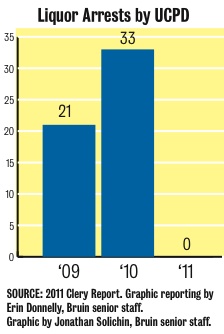University police reported no alcohol-related arrests last year, according to an annual report on crime statistics released earlier this month.
UCPD generally deals with several dozen alcohol infractions each year, according to the Clery Report, which outlines crimes that take place on university property or in the area directly surrounding campus.
Officials said the dramatic drop in liquor arrests ““ compared to about 70 from the last two years ““ is attributed to an on-campus alcohol educational program.
The Alcohol Diversion Program is part of UCPD’s new strategy of dealing with students who violate alcohol laws and are caught drinking underage or being intoxicated in public, said Debra Geller, chief administrative officer of Student and Campus Life.
The number of students stopped by police for misusing alcohol has not changed dramatically but the way the students are punished has shifted in recent years, said UCPD spokeswoman Nancy Greenstein.
Instead of being arrested, the violators are directed to the Office of the Dean of Students, Geller said.
In the past, UCPD arrested and ticketed students who broke alcohol laws. The process of going through the court system can often cost hundreds of dollars and force students to miss class to make court appearances, Greenstein said.
Students can even lose their driver’s license in some circumstances.
“There is no opportunity for real learning in the court system,” Geller said.
UCPD approached the dean’s office in 2010 to find a better way to help students who have an alcohol infraction, Greenstein said. That year, the dean of students set up the diversion program to give students with no prior criminal history who cooperated with police the opportunity to go through UCLA’s program instead of receiving a ticket.
Only students with a minor in possession violation qualified for the program during the trial period.
Now, any student with an alcohol-related violation can choose to go through the educational program. The number of students who qualified for the program jumped from about 20 to more than 70 last year, Geller said.
Once directed to the dean’s office, students have one quarter to attend an on-campus alcohol education event and write a two-page reflection paper on the experience of going through the program.
For many students who were stopped by police for alcohol violations in the past year, the diversion program is a welcomed opportunity.
More than a dozen students attended “The Story of an Almost Dead Student,” UCLA’s first alcohol education program of the year.
During the event Friday night, Student Affairs led a discussion and showed a video of a UCLA alumnus who talked about falling three stories off a balcony after drinking and being unknowingly drugged at a party.
“(The program) gives you a chance to redeem yourself and learn from your mistakes,” said a first-year Hill resident who went to the event as part of the Alcohol Diversion Program and spoke on condition of anonymity. “It really makes you think about how you treat alcohol.”
